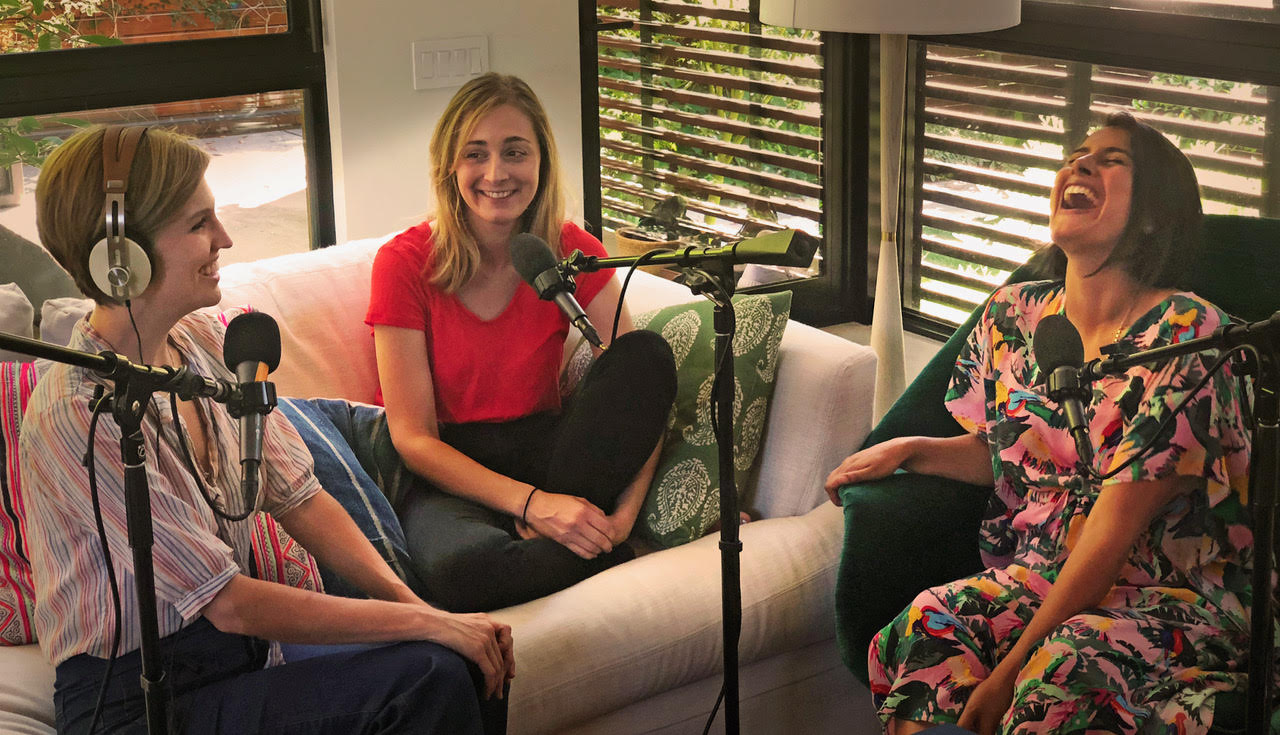Podcasting is booming. In Los Angeles, its growing influence is obvious everywhere: many nights a week local theatres host live, often sold-out, recordings; tote bags and T-shirts proclaiming people’s favourite shows are commonplace; and increasingly podcasters are joining the ranks of the city’s only real aristocracy: celebrities.
According to a 2018 study on podcasting by Edison Research, the number of Americans who listen to podcasts weekly has grown by six million over the last year. Podcasting is also big business. In the US in the last year alone, advertising sales for podcasts have grown by as much as 80 per cent.
It is not just in America that podcasts are surging in popularity. All over the world, and especially in Asia, podcasts – digital audio files similar to radio broadcasts that you can download from the internet – are increasing in popularity among the younger generation as a way to entertain themselves and stay informed.
One of many new voices in podcasting is journalist Joanna Chiu, who co-founded NuVoices, an “international editorial collective” aimed at supporting “self-identified women working on the subject of China”. Since July she has also been a co-host of the group’s eponymous podcast, along with Alice Xin Liu and Sophie Lu.
“I’ve noticed in China the number of podcasts launched, as well as the people who are listening to podcasts, has greatly expanded,” Chiu says. “It’s also great to see that Chinese women born and raised in China are increasingly podcast hosts.”
According to the Edison Research study, the number of US women listening to podcasts went up 3 per cent last year (the percentage remained unchanged for US men). The total US audience for this digital medium, who had listened to at least one podcast in the month before the study’s survey, is estimated to be around 73 million. Women make up 48 per cent of that, but less than a quarter of podcast hosts are female.
Now, though, dedicated women in both the East and West are coming together to change podcasting and create a platform for voices like theirs.
I have had so many degrading and frustrating experiences as a woman in the entertainment industry, [but] my experiences in the podcast world have been really positive
Amanda Lund, co-host of the Earios podcast
Back in Los Angeles, two of comedy podcasting’s most popular and prolific hosts – Maria Blasucci and Amanda Lund, along with their friend and long-time collaborator, writer and producer Priyanka Mattoo – are launching Earios: a podcast network run by women boasting “podcasts by women, for everyone, no creeps allowed.”
“Part of the benefit of podcasting is that the barrier to entry is so low, you can just do it at home on your phone,” Mattoo says. “You don’t need the resources, you don’t need somebody to say they’ll buy your script, you don’t need cameras and actors and this and that. It’s something you can just create on your own.”
That flexibility has obvious appeal for minorities who have struggled for generations to have their voices heard by predominantly white, male media gatekeepers.
“I’ve spent a lot of time as an actress memorising other people’s words and competing for the chance to be a tiny part in other people’s projects,” Lund says. “It can make you feel really powerless. Podcasting is so great because it allows anyone with a vision to create and have their voice heard without having to jump through industry hoops or have a lot of money.”
It wasn’t long ago that the women behind Earios were shopping their web series Ghost Ghirls to television executives, only to be told time and time again that no one would watch a show with two female leads – a criticism that would be unimaginable if levelled against a show with male lead characters.
Lund and Blasucci co-created and co-host the hit podcast The Big Ones and Lund is the creator and host of her own parody podcast The Complete Woman. Both women are fixtures on many other popular podcasts, including James Bonding and Spontaneanation with Paul F. Tompkins. Their success serves as the ultimate rejoinder to anyone who has ever claimed there isn’t an audience – and market – for their brand of comedy.
“I have had so many degrading and frustrating experiences as a woman in the entertainment industry, [but] my experiences in the podcast world have been really positive,” Lund says. “I think the space, as a whole, is really inclusive.”
The China podcasting scene is really becoming vibrant … There’s really this infusion of female voices in new podcasts and that is something that’s different in China
Joanna Chiu
Women, though, are still the minority in podcasts and the relative scarcity of female perspectives is inescapable for casters and listeners alike.
“Most of the big networks are run by men,” Lund says. “That’s why it’s important that women start to carve out a space right now, so that women can make sure to be equally represented.”
“It’s not so much that we felt like no one will let us do what we want to do in podcasting, it’s more we wanted to find our spot,” Blasucci says. “We have a point of view and I feel like we could create a community based on that point of view that hasn’t been touched, so why not go for it.”
Blasucci says that they started out wanting to have a place where they and their friends – both male and female – could do podcasts. She quickly realised, however, that “all the friends that we knew who had a cool point of view were women”.
While Blasucci and Lund were starting out in podcasting, more than 6,000 miles away in Beijing the women who would go on to found NuVoices were also facing sexism in the world of journalism and lacked a platform where their specific experiences and stories could be heard. Podcasting was the obvious answer.
“The China podcasting scene is really becoming vibrant,” Chiu says. “Podcasts have become so popular that it’s not even niche any more. It’s practically mainstream. There’s really this infusion of female voices in new podcasts and that is something that’s different in China compared to the US, where it seems like most of the popular podcasts are hosted by men.”
Members of the NuVoice collective find podcasting’s inherent intimacy, flexible format and lack of time constraints perfectly suited to conveying complicated, sometimes divisive issues in a humane, accessible way.
“It’s harder to dismiss long-standing problems like unequal pay when you’re listening for an hour to smart, competent and complicated individuals who are raising very nuanced arguments on why they should be treated better,” Chiu says.
In the dicey media environment of China, podcasting holds enormous appeal. Because podcasts can be downloaded from so many different sources, they are more difficult for the government to censor. Podcasting can create a safe space not only for women to bring up potentially controversial or difficult topics, but also for the region’s frequently at-risk journalists.
From the second we announced Earios we’ve had calls from huge marketing teams and huge ad sales companies
Priyanka Mattoo
That sense of safety and freedom is obvious in the first two episodes of the NuVoices Podcast. The Nuvoices hosts interview female news assistants who work for the foreign media in China about their experiences in what is already a difficult and often thankless job.
In the second episode they interviewed Yuan Yang, the Beijing-based tech correspondent for the Financial Times, about the #MeToo movement in China and how it has continued to grow despite official censorship.
NuVoices plans to launch an online magazine soon, but will continue to use the podcast to investigate issues in Greater China affecting women and to provide women and minorities working in the region with a platform through which to have their voices heard.
Podcasters like those behind Earios and NuVoices have also exploded the concept of female-specific content in general.
NuVoices invites rarely heard voices in arts and culture, as well as heavier topics, to talk on the podcast. The third episode features an interview with Chinese fantasy writer Mima (aka Qima) who wants to “create China’s Game of Thrones”.
And at Earios, there are plans for narrative shows and ones covering science, food and wine, and true crime. “It doesn’t have to be for women, it just has to be by women, ” Blasucci says.
The idea that women are only interested in soap operas and beauty tips is as sexist and spurious as it has always been. The proof is in the podcasting, where women produce and consume content about everything from serial killers and action movies to politics and in-depth cultural criticism.
Both the teams at Earios and NuVoices have been pleasantly surprised by the reaction to their ideas so far.
“I really can’t think of one example where we got negative feedback,” Chiu says.
Earios’ Mattoo says they have even attracted a lot of attention from big business. “From the second we announced Earios we’ve had calls from huge marketing teams and huge ad sales companies. We’ve been offered large sums of money for half the company but that’s not going to happen … it’s women-run and it’s always going to be.”



